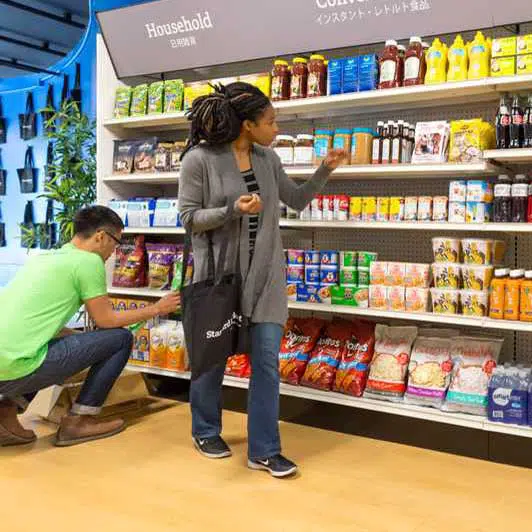Standard Cognition Corp., a San Francisco-based provider of autonomous checkout systems based on artificial intelligence, expects to have the first of Alimentation Couche-Tard’s Circle K convenience stores retrofitted and up and running in early 2021, with potentially dozens more to follow.
The first store to adopt the technology will be in Phoenix. Circle K has nearly 7,300 stores in 48 states. Laval, Quebec-based Alimentation Couche-Tard operates nearly 14,500 convenience stores worldwide.
To shop at a store using Standard’s autonomous checkout, consumers download Standard’s app, which can be white-labeled or marketed under Standard’s brand. Inside the store, consumers can open the app, press the check-in button, and begin shopping. Standard’s system keeps a running tab of the items selected or put back on the shelf. When the consumer is ready to check out, she stops at a kiosk and pays using a mobile wallet, credit or debit card, or cash that can be placed in the kiosk. The system sends a receipt to the consumer via email.
With Circle K, the new system is not replacing cashiers. They will be available in-store for consumers that want to use them and for the purchase of age restricted items, such as alcohol and tobacco.
While Standard Cognition’s platform is similar to the cashierless-checkout technology used in Amazon Go stores, it does not utilize shelf sensors that indicate when a consumer removes an item from the shelf, as Amazon Go’s system does. Instead, Standard’s system relies on ceiling-mounted cameras throughout the store to track items removed from the shelf. That data is automatically shared with the store’s point-of-sale system, which keeps a running tally of the items selected.

Standard integrates its autonomous checkout system with a merchant’s point-of-sale system. It says stores can be retrofitted overnight to minimize disruption to the store’s business. In comparison, installing shelf sensors can take weeks, requiring the store to be closed while shelves are ripped out and replaced and sensors are installed, the company argues.
“Stores don’t have to be built from the ground up or rebuilt, like Amazon Go, which makes our system more cost-effective and quicker to implement because of its lighter footprint,” says Standard chief executive and cofounder Jordan Fisher.
Another advantage, Fisher argues, is that merchants can retain flexibility over in-store merchandising, such as alternating or setting up displays for promotional and last-minute items. Shelf sensors don’t allow the same flexibility, as specific items are linked to each shelf’s sensors.
“With shelf sensors, certain items have to be placed on certain shelves, which limits a merchant’s flexibility displaying merchandise, especially for impulse buys,” says Fisher, who adds convenience stores are expected to be a key market for Standard going forward.
From a privacy standpoint, Standard adds that its system does not use biometric data, such as facial recognition, to identify and track consumers. It anonymizes consumer data to prevent brands from targeting individual shoppers by analyzing consumers’ purchasing patterns.
Merchants with a store of 1,000 to 3,000 square feet can expect a 12-to-24-month return on investment, Jordan says. The cost of Standard’s system, which the company declines to reveal, is coming down rapidly, and that rate is expected to accelerate in the next two years, Fisher adds.
Prior to starting a retrofit, Standard studies a store’s layout for months. This process includes flow patterns and operations, fixtures and lighting, and inventory management and replenishment processes. In the case of retrofitting a chain such as Circle K, this pre-installation process can take six to nine months. Once completed, however, Standard can replicate implementation plans for each store, which can speed rollout, Fisher says.





